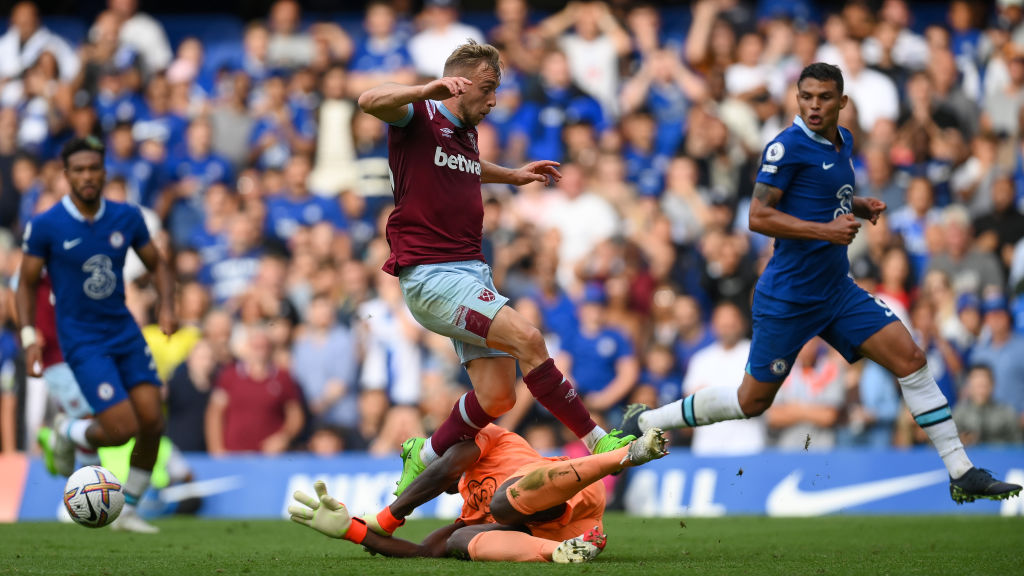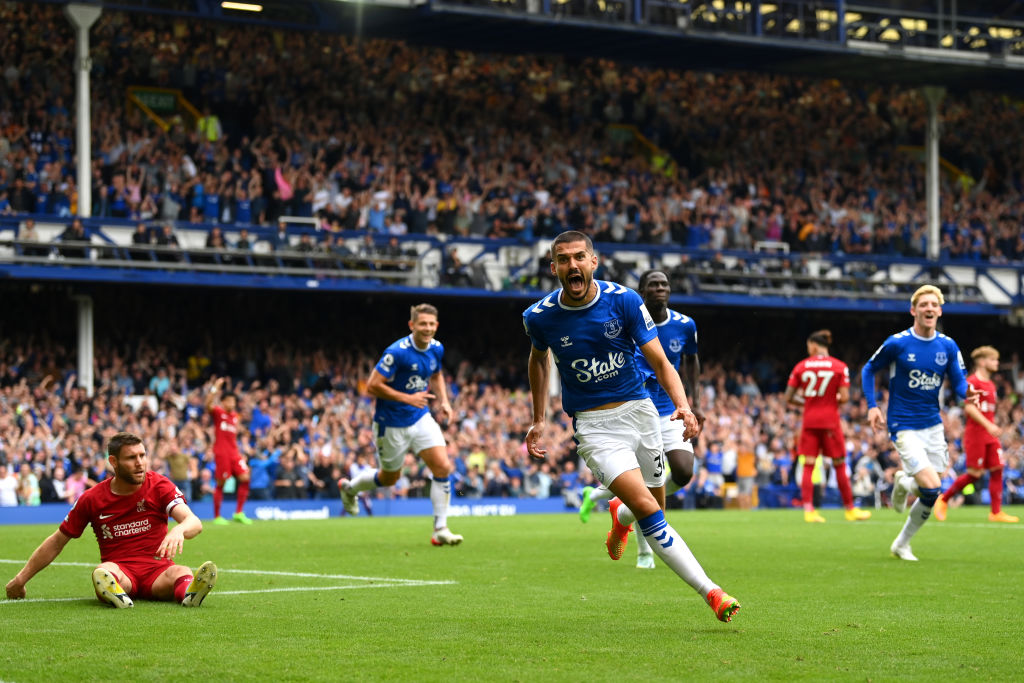The Premier League VAR table: Where your team would be in the league without technology
VAR has been in the headlines for all the wrong reasons this weekend – so where would we all be without out?

VAR was meant to be invisible. Or at the very least, unnoticeable enough that Premier League football wouldn't be impacted too much from the bods at Stockley Park.
But every week seems to dig up fresh controversy when it comes to those all-seeing, (occasionally) all-knowing video assistant referees, trawling over footage in their Hillingdon-based booth to help on-field officials. Just this weekend, Maxwel Cornet had what West Ham – and particularly captain Declan Rice – felt to be a perfectly good goal ruled out, Virgil van Dijk got away with what Everton deemed to be a red and Gabriel Martinelli had his opener against Manchester United chalked off for what Arsenal fans called a harsh foul.
There are those that say that these decisions even themselves out. That the omniscient eye of Mike Dean et al has no leaning towards one shade or shirt, nor the other. That with or without VAR, cream always rises. But is that true? Would some teams find themselves above others but for the intervention of technology?
The VAR table and how to calculate the Premier League without technology

Video assistant referees may feel like a constant presence in Premier League fixtures but they're only actually present in four different footballing situations – that's for goals, penalty decisions, direct red cards and mistaken identity (hello, Kieran Gibbs).
These are the only times in which an official at Stockley Park can intervene and even then, we can only judge the VAR table on goals and penalties that were given. Take Virgil van Dijk's possible red card against Everton: maybe VAR should have given it but there's no tangible way to assess how it would have affected the game.
For our VAR table, we can only rule out goals that were given by video assistance, give goals that were ruled out by video assistance and wipe out scored penalties that were awarded by video assistance. We can't go giving goals to teams who should have been given penalties, since that's not a certain goal. We can't correct wrong on-field decisions either that VAR should have intervened with: that's not the point in the table.
Once you remove every possible opportunity that VAR awarded a goal or took one away, the Premier League table looks a little like this…
Get FourFourTwo Newsletter
The best features, fun and footballing quizzes, straight to your inbox every week.
| VAR table position | Real world position | Club | P | W | D | L | F | A | GD | Pts | Where would they be without VAR? |
|---|---|---|---|---|---|---|---|---|---|---|---|
| 1 | 2 | Manchester City | 6 | 5 | 1 | 0 | 20 | 6 | 14 | 16 | +1 place |
| 2 | 1 | Arsenal | 6 | 5 | 0 | 1 | 16 | 7 | 9 | 15 | -1 place |
| 3 | 3 | Tottenham Hotspur | 6 | 4 | 2 | 0 | 13 | 5 | 8 | 14 | Same place |
| 4 | 4 | Brighton & Hove Albion | 6 | 4 | 1 | 1 | 12 | 5 | 7 | 13 | Same place |
| 5 | 5 | Manchester United | 6 | 4 | 0 | 2 | 8 | 9 | -1 | 12 | Same place |
| 6 | 8 | Brentford | 6 | 2 | 4 | 0 | 14 | 9 | 5 | 10 | +2 places |
| 7 | 7 | Liverpool | 6 | 2 | 2 | 2 | 15 | 7 | 8 | 8 | Same place |
| 8 | 14 | Wolverhampton Wanderers | 6 | 2 | 2 | 2 | 4 | 4 | 0 | 8 | +6 places |
| 9 | 9 | Leeds United | 6 | 2 | 2 | 2 | 10 | 12 | -2 | 8 | Same place |
| 10 | 6 | Chelsea | 6 | 2 | 2 | 2 | 8 | 10 | -2 | 8 | -4 places |
| 11 | 11 | Newcastle United | 6 | 2 | 1 | 3 | 7 | 8 | -1 | 7 | Same place |
| 12 | 12 | Southampton | 6 | 2 | 1 | 3 | 7 | 10 | -3 | 7 | Same place |
| 13 | 13 | Bournemouth | 6 | 2 | 1 | 3 | 5 | 19 | -14 | 7 | Same place |
| 14 | 16 | Everton | 6 | 1 | 3 | 2 | 5 | 6 | -1 | 6 | +2 places |
| 15 | 10 | Fulham | 6 | 1 | 3 | 2 | 9 | 12 | -3 | 6 | -5 places |
| 16 | 15 | Crystal Palace | 6 | 1 | 2 | 3 | 7 | 10 | -3 | 5 | -1 places |
| 17 | 18 | West Ham United | 6 | 1 | 2 | 3 | 5 | 9 | -4 | 5 | +1 places |
| 18 | 17 | Aston Villa | 6 | 1 | 1 | 4 | 5 | 10 | -5 | 4 | -1 places |
| 19 | 19 | Nottingham Forest | 6 | 1 | 1 | 4 | 4 | 14 | -10 | 4 | Same place |
| 20 | 20 | Leicester City | 6 | 0 | 1 | 5 | 8 | 17 | -9 | 1 | Same place |
So really, Manchester City would be top of the league, if not for VAR. Video assistance helped award one of Newcastle United's three goals against the Citizens in their two clubs' 3-3 draw – and with those two extra points, Pep Guardiola's side would leapfrog Arsenal.
The Magpies earned that draw, plus another against Wolves with VAR intervening, though their weekend stalemate with Crystal Palace works out as three points, had their goal not been chalked off retrospectively.
Speaking of Wolves, they have been the big losers of video technology so far this season. Bruno Lage's boys find themselves 14th in the Premier League but were it not for overturned decisions, they could be eighth.
Brentford, likewise, could still be unbeaten if not for VAR, while Everton would've earned their first win of the season if Conor Coady's goal against Liverpool had been allowed to stand. Max Cornet's goal against Chelsea would have given West Ham the point they needed to rise out of the bottom three.

While Irons will feel aggrieved for weeks over their Stamford Bridge robbery, Chelsea have been the biggest beneficiaries over VAR in terms of game-turning moments in our table.
They snatched three points instead of one at the weekend – though, the VAR table doesn't account for the hair pull on Marc Cucurella which Mike Dean admitted he was wrong to ignore. Perhaps a free-kick there would have prevented that Tottenham equaliser.
That's ultimately why even the VAR table is a complete grey area. There's no way to tell how a match can pan out if a goal is awarded at a critical stage of a game, how a sending-off can affect things or whether a penalty could in fact change the state of play completely. Maybe there's no way to find out who really should be top of the league, all things considered throughout the campaign…

Mark White has been at on FourFourTwo since joining in January 2020, first as a staff writer before becoming content editor in 2023. An encyclopedia of football shirts and boots knowledge – both past and present – Mark has also represented FFT at both FA Cup and League Cup finals (though didn't receive a winners' medal on either occasion) and has written pieces for the mag ranging on subjects from Bobby Robson's season at Barcelona to Robinho's career. He has written cover features for the mag on Mikel Arteta and Martin Odegaard, and is assisted by his cat, Rosie, who has interned for the brand since lockdown.
